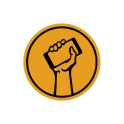Words are not violence - but violence is
Charlie Kirk was tragically killed this week for speaking his mind.
A well-known conservative activist gunned down while giving a speech at Utah Valley University, leaving behind his wife and two young children.
Think about that: a man killed for exercising his democratic right to speak. Not shouted down, not protested - shot.
That is violence.
And if we need a reminder of why it matters to keep our categories straight, this is it. Violence takes away lives. It ends debate permanently. It shuts someone up forever.
There’s a dangerous idea floating around these days: ‘words are violence’. We hear it in classrooms, from administrators, and in training sessions where university students are told that hearing the ‘wrong’ idea is a form of harm. That uncomfortable debates are too much to bear. That students must be shielded from words that make them feel unsafe.
This is nonsense – and dangerous nonsense at that. Words are not violence. Words don’t break bones or put people in hospital. They don’t leave children without parents.
Words can hurt feelings, yes. They can anger, offend, even shock. But treating speech like violence cheapens the meaning of actual violence, weakens people’s ability to handle debate, and turns disagreement into a crisis.
If we teach young people that being exposed to tough ideas is the same as being attacked, we make them more fragile, not stronger. And we send the toxic message that the only way to truly be safe is to shut people up. That’s not education – it’s indoctrination.
And here’s the real danger: when you tell people long enough that words are violence, someone will eventually treat violence as a reasonable response to words. If speech is an ‘attack’, then a bullet starts to look like self-defense. That twisted logic is how free societies crumble.
The reaction to Kirk’s assassination showed that most people, left and right, still know the difference. Leaders across the spectrum condemned the killing and called for civility. But civility isn’t enough. We need courage. Courage to say that speech - even offensive speech - is not a threat, not a weapon, not violence.
Because if we can’t say that, then we can’t have debate. We can’t have universities that are places of learning instead of indoctrination. We can’t have a society where disagreements are settled with words instead of fists, knives, or guns.
This is why together at the Free Speech Union, we push back so hard against the trend of treating words as harm. If we only allow ‘safe’ speech, speech everyone approves of, we don’t have free speech at all. And if we keep telling young people that words are dangerous, we make them fragile, fearful, and easy prey for those who believe silencing opponents by force is justified.
Charlie Kirk’s death is a tragedy. But it’s also a warning. We cannot let the line between speech and violence get blurred. We cannot let fear or fragility turn free expression into a crime.
The only way forward is a recommitment: to free speech, to open debate, to the right to disagree and ability to hold differing views. To show future generations that resilience comes from grappling with hard ideas, not hiding from them.
Charlie Kirk should be alive today. His ideas should be debated, challenged, even ridiculed if you like - but not silenced with a gun. The right to speak should not come at the risk of death.
The right to speak must be protected, defended, and celebrated. If we have the courage to hold that line, then there’s hope: that the next generation won’t fear words, but embrace them; that disagreement won’t end in violence, but in deeper understanding; and that free speech will remain the cornerstone of a free society.
Jillaine Heather | Chief Executive








